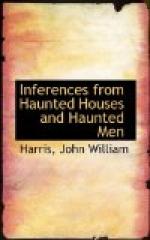About two years later a distinguished priest, well known in London, also suddenly waved an umbrella and behaved as if he were angry. But he showed hardly any sign of insanity, and on applying to the proper court for release from supervision, was declared sane by a jury.
Strength of mind and religious feeling doubtless saved him from the fate of Mr. Cope. A brave man can resist such an attack under favourable circumstances.
It is well known to those who have read the Biography of Lawrence Oliphant, and that of Dr. Anna Kingsford by Professor Maitland, that Lawrence Oliphant, who became a Shaker (a member of a sect who employ hypnotism, as Mr. H. Vincent describes, to bind their neophytes to them),[5] wrote commonplace vulgar verse on religious subjects, although himself a highly cultivated literary man.
[Footnote 5: “Elements of Hypnotism,” Appendix, note 3, p. 270.]
Hypnotism doubtless led to this; the verse thought out in some vulgar Shaker’s mind was transferred to Oliphant. Not only was Oliphant induced to become a Shaker, but his wife became one also, and both sacrificed much money to the society and agreed to live in celibacy. Let us continue again from the known to the unknown. Mrs. Lawrence Oliphant’s brother, the late Captain Lestrange, R.N., left his ship without leave, to avoid his wife. He had married an undesirable person, who has also been dead some years.
He was a most intelligent officer, and commanded the despatch vessel of the Admiral in command of the Mediterranean fleet. It is most probable that he was weakened by hypnotism, otherwise he would not have entered into this marriage, or allowed himself to be broken down by disgust at its consequences. An exceedingly manly, robust character, and devoted to his profession, he could not without being hypnotised have deserted his ship. The only reason he had for leaving it was that his wife threatened to come to the Mediterranean to Malta. There was a gang of criminal hypnotists on the Mediterranean coast then. Captain Lestrange fled to Copenhagen, a place connected with most of the attacks of criminal hypnotists, mentioned before and hereafter. He had visited it on duty two or three times, and been in contact with others who suffered. He died two or three years afterwards, probably of a broken heart. Here, for the second time, a connection between two victims is traceable.
In the former case, the two were simply neighbours; the probability that in each pair of cases one gang was concerned is very great. One gang, if not both, were connected with Copenhagen; indeed, they may have been the same gang.
If striking haunted house stories are rare, the reason is that, on obvious grounds, gangs of hypnotists are rare also.
The writer believes that Lord Howe’s and his sister’s courage prompted the attack on them by a gang of hypnotists 120 years ago.[6] Poltergeist disturbances are caused by a single person generally; it is not impossible that in rare cases there is a confederate.




